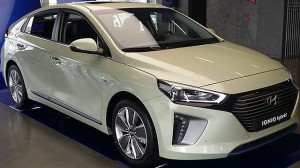 Hyundai plans to make use of a hybrid technology utilized in its new Ioniq in other models in a span of four years. The i30 hatchback has been set to be launched in the year 2017 and Hyundai has claimed that this new generation car will benefit from the electrical powertrains of Ioniq. Other models within this range will also get plug-in hybrid and hybrid models as the carmaker struggles to meet the new emission regulations formulated.
Hyundai plans to make use of a hybrid technology utilized in its new Ioniq in other models in a span of four years. The i30 hatchback has been set to be launched in the year 2017 and Hyundai has claimed that this new generation car will benefit from the electrical powertrains of Ioniq. Other models within this range will also get plug-in hybrid and hybrid models as the carmaker struggles to meet the new emission regulations formulated.
The Ioniq was officially revealed during the Geneva Motor Show that was held in March. The Ioniq set a new trend by having three types of electric powertrains within a single body shell. They will include a hybrid, electric version, and a plug-in version. The new entrant will strongly compete with the Toyota Prius and the Nissan Leaf in terms of range. The Ioniq will most likely steal the sales from Nissan’s Leaf that has a range of 107 miles on a full charge, whereas the Ioniq EV has an estimated 155 mile range.
The three models of Ioniq, as well as it’s the automaker’s hydrogen powered SUV still haven’t managed to meet the average carbon dioxide emission targets set. By the year 2021, all cars will have to meet the 95g/km emission standard. This is one of the key reasons why Hyundai is planning to release new models based on its new hybrid technology.
Additionally, the novel hybrid technology by Hyundai will be offered to more mainstream car models to meet the needs of different customers. One such example is the Toyota Prius, which has a repackaged hybrid powertrain in the form of a modernized Auris Hybrid. According to an interview with Auto Express, Product Marketing Manager at Hyundai, Dennis Elsweier, emphasized the need to have an appropriate powertrain for its car line-up for 2020 to 2021. He further added that with the Ioniq, there are three different electrified powertrains while with the ix35, there is the use of fuel-cell technology. This presents a toolbox that can be used as a reference for future developments.
Beyond the target of 2021, there is a possibility of Hyundai adding a hydrogen fuel-celled technology that was utilized in IX35 to Ioniq to give a 4th powertrain. The carmaker’s future developments will depend on customer acceptance and infrastructure growth. Elsweier said that the infrastructure is vital when looking at fuel-cell technology. A similar technology is applicable to electric cars. Currently, infrastructure is a limiting factor, though we can still consider the customer perspective or the benefits to get from using fuel-cell technology on a wide scale basis. Based on the information, it is clear that Hyundai is on its way to broadening its hybrid car range.